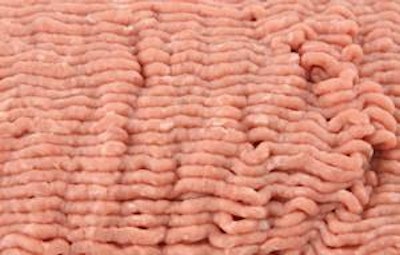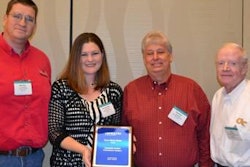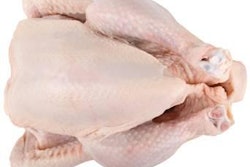
Dr. Kenneth Petersen, IEH Laboratories & Consulting Group, recently commented on the impact of the Food Safety and Inspection Service's announcement requiring HACCP plan reassessments for not-ready-to-eat comminuted poultry, which includes ground turkey and chicken as well as mechanically separated turkey and chicken.
Some aspects of this policy notice, which was published in the Federal Register on December 6, will go in to affect after the 90 days without comment, while other parts are presented for comment from interested parties and will not be acted on until after the comment period.
“I have told people in the poultry industry that they do have to change their current mind set. Much of what FSIS is pursuing with Salmonella in poultry is not the same, but the approach is very similar to how the agency engaged the beef industry for E. coli 0157 in ground product. FSIS understands a number of things about ground product, lotting, and labeling that the poultry industry has, frankly, not had to pay attention to.”
Petersen, who was the assistant administrator of the office of field operations for USDA FSIS from 2005 to 2012," said Petersen, president, division of regulatory compliance at IEH.
Salmonella standard for ground and mechanically separated
In the announcement, FSIS is charging all plants that produce ground and or mechanically separated turkey or chicken to reevaluate the hazards in their operations based on the information gleaned from the two major ground turkey recalls and salmonellosis outbreaks in 2010 and 2011. Because mechanically separated product has been incorporated in some ready-to-cook poultry products in the past, FSIS will begin sampling mechanically separated product along with ground turkey and chicken products. The size of each sample of product taken will be increased from 25 grams to 325 grams, which will likely lead to a greater number of Salmonella-positive samples if processors make no changes in their systems. Salmonella test results for mechanically separated poultry will likely be higher than for traditional ground poultry, and this could raise the baseline standards for ground products as a whole.
In some poultry plants, all of the birds and parts emerge from chilling systems at less than 40 F and meat scraps and trimmings and bones from cut-up and deboning lines are conveyed to the grinding equipment to make mechanically separated product, everything is done in line, with no accumulation or carryover of materials to be ground. Other plants accumulate meat scraps and trimmings in various places in the plant and then periodically bring vats or totes over to be ground, or they bring in meat scraps and bones from other facilities for grinding, or they bring salvage parts over from evisceration at the end of the shift.
Petersen commented on plants that bring in bones from other plants, or that grind carryover material from one day to another, or that accumulate trim over extended time periods prior to grinding. He said, “These plants are going to have to look in the mirror and rethink that. The beef industry had to do things that they would have preferred not to, but events made them change what they were doing. I think the poultry industry is going to make some of those changes. They need to rethink their lotting, their interventions and what they are going to do with mechanically separated. Processors need to better understand what they want to do in their process and what they are accomplishing in the process and how do they know it.”
Tighter standards
FSIS intends to set the Category 1 standard for ground chicken and ground turkey at six and seven positive samples, respectively, out of 26 total samples. Petersen said that processors need to “shrink the variability of the Salmonella levels so that they can consistently meet the standard for ground products.” He said that this will be the case whether a grinder is processing its own birds or buying parts, Salmonella levels on birds arriving at the plant for slaughter will need to come down. Some processors have already made changes like removing drumstick bones prior to grinding and employing antimicrobial rinses or dips prior to grinding, but these changes alone won’t guarantee low Salmonella levels in ground products if the Salmonella levels on the birds arriving at the plant are high.
Petersen said that poultry grinders need to shrink lot sizes down. “You need to look at what you are grinding.” He said that some companies will need to take a look at things like necks and neck skins and maybe they won’t be ground.
“The status quo just isn’t going to cut it. You need better dialog and collaboration of research within the industry. Everyone has to better understand multi-point accomplishment. You need to look seriously at your grinding source stream. Carryover of product is 1998 thinking you need to stop. Plants need to isolate their lots better through grinding sourcing and testing. This can all be accomplished,” Petersen said.
Mechanically separated for cooking
There has been a lot of discussion among poultry processors regarding the need to test mechanically separated poultry products that are intended for cooking only. Petersen explained that FSIS can sample whatever they want at any time, but he thinks they will likely to want to use a lot of the agency’s resources to sample product that is not bound for cooking. “If the processor is labeling product for cooking only and that is supported in their HACCP system, then it is unlikely that FSIS is going to sample them, but just getting letters from customers stating the intended use of the mechanically separated product isn’t enough,” he said.
Companies that export mechanically separated poultry may wind up getting sampled because it is more difficult to document that the product goes to cooking. Petersen said that the agency has been sensitive to trade issues in the past and that the sample sets pulled would likely include all ground products the processor produces not just mechanically separated.
Petersen suggested that plants which export mechanically separated poultry need to set up protocols to demonstrate that there is a reasonable confidence that their product is going to cooking. He said that this might not be as locked down as it would be if the product was cooked domestically, but it should help persuade FSIS that the product is not being sold for incorporation in ready-to-cook products. Petersen said that poultry processors need to make comments addressing the export situation and state the protocols that they have set up.


















